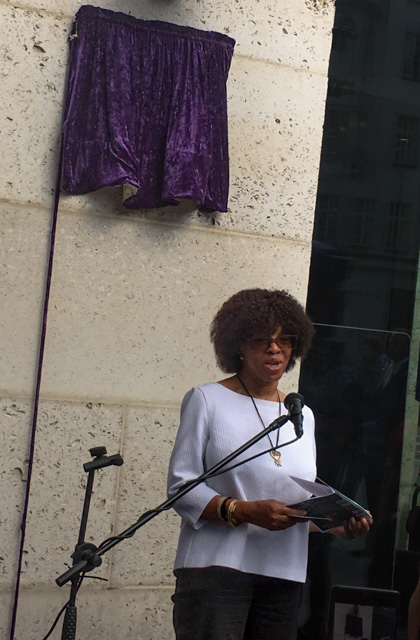Exactly 246 years after her pioneering book was published in London in 1773, Philis Wheatley has finally been honoured with a befitting Blue plaque in the City of London.
The historic blue plaque was installed on Dorsett City Hotel, the former site of Wheatley’s publisher and was unveiled on July 16, 2019, by the Nubian Jak Community Trust, a commemorative plaque and sculpture scheme that highlights the historic contributions of Black and minority ethnic people in Britain.
The unveiling event was well attended by members of the black community as well as members of the Nubian Jak Community Trust, Black History Walks, the US Embassy and Dorsett City Hotel who sponsored and helped make the blue plaque a reality.
The event was also attended by students of Canons High School who took part in producing the Phillis Wheatley exhibition and gave various performances as part of their performance.

According to the African Central Journal, the event was enriched by a brief history of the legendary Phillis Wheatley and a recital of some of her poems. A West African ceremony was also enacted in honor of her roots at the event.
At the age of 12, after being sold into slavery from her home in West Africa, Phillis Wheatley wrote her first poem to the University of Cambridge-New England which was made public. This would start a writing career for the enslaved West African girl who at 14 saw her first poem “On Messers Hussey and Coffin” published in the Mercury, a newspaper in Newport, Rhode Island. She would later travel to England at the age of 20 in July 1773 with Nathaniel Wheatley, her master and owner, to get her first book “Poems of Various Subject, Religious and Moral” published in the same year.

Phillis Wheatley is celebrated as the youngest and earliest black woman to write or even publish a book. In recent times, her story has been re-shared and made accessible to more blacks and African Americans to celebrate those that paved the way for them. However, she has not been given the due credit and honor she rightfully deserved in the UK until now.
Phillis Wheatley joins the likes of several history-making blacks including Bob Marley who was actually the first to be honored by the Nubian Jak Community Trust back in 2006.










